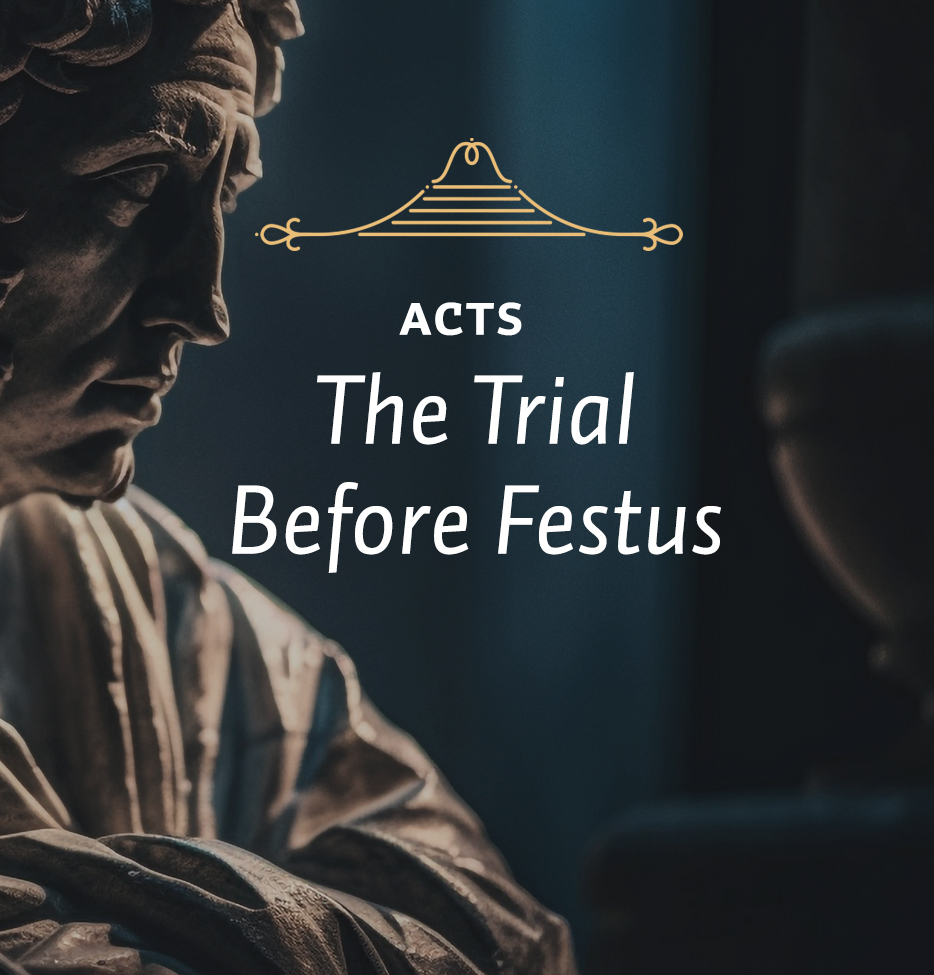In his defense, Paul said that he had not done any of these charges against him, at least not in ways that would bring him into danger in a Roman court. John Stott notes the following:
If in his trial before Felix Paul had emphasized the continuity of “the Way” with Judaism, in this trial before Festus he stressed his loyalty to Caesar. Caesar is mentioned eight times in this chapter, five times as Kaisar, twice as Sebastos (vv. 21, 25), the Greek equivalent of Augustus, and once as ho Kyrios, “the Lord.” Paul knew that he had not offended against Caesar (v. 8) and that he stood in Caesar’s court (v. 10).1
Luke, the author of Acts, says that although they brought “many serious charges against him,” they could not “prove” them (v. 7). So all Paul had to do in these circumstances was deny the charges. The burden of proof rested with his accusers, and Festus, being a perceptive judge at least in this respect, understood it and knew that there were no grounds for condemning the apostle.
Ah, but Festus wanted “to do the Jews a favor.” So he said, “I don’t know how to resolve this, Paul, but it might help the situation if we could transfer your case to Jerusalem and let you be tried there.” It is hard to think that Festus could have suggested this with pure motives. For one thing, he must have known the case’s previous history. He must have known that Paul had been brought from Jerusalem to Caesarea precisely because of the danger. Paul could never get “a fair trial” in Jerusalem.
But even more than that, can we believe that Festus hadn’t heard of the plot to have Paul assassinated? Hadn’t he examined the records? Hadn’t he seen the letter written by Claudius Lysias, explaining that there was a plot to kill Paul?
One of the commentators suggests that this crafty Roman governor might have thought that he could solve the dilemma if he could get Paul to concede to go to Jerusalem for trial, and perhaps along the way he might be assassinated.2 I do not know if that was the case, but I know that wanting to do one of the parties a favor was not the way to conduct an honest trial.
With the wisdom God had given him, Paul understood the situation well and knew that the only way he could hope to get his case resolved fairly was to exercise his right as a Roman citizen to appeal from local jurisdiction to the court of Caesar in Rome. That suited Festus equally, of course. It got the sticky matter out of his hands. So he replied, “You have appealed to Caesar. To Caesar you will go” (v. 12).
We have looked at the accusers and the judge. We look finally at the accused, Paul himself. What a contrast! Here were the accusers who, out of hatred, were trying to assassinate the prisoner. Here was Festus, who failed to do what he should have done because of his desire for popularity. And Paul? Paul was the prisoner, the accused, the one in danger of his life. Yet he was the only one who actually emerged victorious. He was victorious because he was innocent of these false charges and because he depended on God, whom he trusted in this as in all other circumstances.
That is how you and I have to stand in the world. Most of us do not live in circumstances where the world’s accusations against us are as fierce as these were against Paul, though there are places in the world where they are harsh and Christians do suffer physically. Nevertheless, you and I face a world whose value system is hostile to the standards of the Lord Jesus Christ and in which we are constantly pressured to compromise or deny our faith. How are you and I, weak and sinful human beings as we are, to stand against such pressure? How are we going to stand when the world says, “You have to go along to get along”? “You have to bend a little bit. Nobody who is rigid ever gets ahead. You have to do things the way other people do them, if you are going to survive—compromise here, shave the truth there. You don’t have to tell the truth. If you tell the truth, your competitor is going to get the edge on you, and pretty soon you’ll be broke.”
How are you and I going to stand for righteousness in a world like that? In tomorrow’s study I will suggest three answers.
1John R. W. Stott, The Message of Acts: To the Ends of the Earth (Leicester, England: InterVarsity, 1990), 367.
2C. F. D. Moule, A Chosen Vessel, pp. 69, 70. Cited by Everett F. Harrison, Acts: The Expanding Church (Chicago, IL: Moody, 1975), 366.






